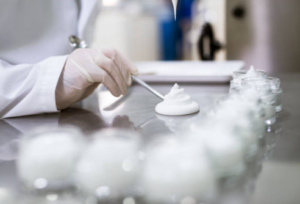

Emulsification


In the realm of skincare, it seems that new ingredients are constantly making headlines, promising to be the next big thing for flawless skin. Among these ingredients are PEGs, which you may have come across in the ingredient list of your favorite skincare products. But what are PEGs, and should you be concerned about their presence in your beauty routine? In this comprehensive guide, we’ll delve deep into the world of PEGs in skincare, exploring their roles, potential benefits, and controversies to help you make informed decisions about what goes on your skin.
Polyethylene glycols, commonly known as PEGs, are synthetic polymers derived from ethylene oxide, a petroleum-based compound. They belong to a class of chemicals called “polyols” and have a wide range of applications in various industries, including cosmetics and skincare.
PEGs are created through a chemical process called polymerization. Ethylene oxide molecules are combined to form long chains of PEGs, and the number at the end of “PEG” (e.g., PEG-8, PEG-100) indicates the size or molecular weight of the polymer. Different molecular weights of PEGs serve different purposes in skincare formulations. For example, lower molecular weight PEGs are used as emulsifiers, while higher molecular weight PEGs may function as thickeners or humectants.
There is a wide variety of PEG compounds used in skincare products, each with its unique properties and functions. Here are some common types of PEGs you may encounter:
While PEGs offer several advantages in skincare, it’s essential to keep in mind that the benefits may vary depending on the specific PEG compound used and the formulation of the product. Not all PEGs are created equal, and their effectiveness can be influenced by factors such as their molecular weight, concentration, and the presence of other ingredients in the formulation.
Ultimately, when considering skincare products containing PEGs, it’s essential to assess your skin type, preferences, and any potential sensitivities. Additionally, consulting with a dermatologist or skincare professional can help you determine which products with PEGs align with your skincare goals and needs.
PEGs have become a subject of controversy and concern within the skincare community. While they offer various benefits, there are valid reasons for individuals to be cautious about their use in skincare products. Here are some of the key issues associated with PEGs:
Considering the controversy surrounding PEGs, here are some factors to keep in mind when evaluating skincare products:
Ingredient Transparency: Look for brands that prioritize ingredient transparency. Brands that disclose the source and purity of their PEGs, as well as the absence of harmful impurities, provide consumers with more information to make informed choices.
Patch Testing: If you have sensitive skin or have experienced skin sensitivities in the past, it’s advisable to perform a patch test when introducing products containing PEGs. Apply a small amount of the product to a discreet area of your skin and monitor for any adverse reactions.
Consult a Dermatologist: If you have concerns about using products with PEGs or have experienced skin reactions, consult a dermatologist or skincare professional. They can provide guidance on suitable products and ingredients tailored to your skin’s needs.
Choose PEG-Free Alternatives: If you prefer to err on the side of caution, explore skincare products that are formulated without PEGs or opt for natural and organic alternatives. Many brands offer PEG-free options that may align better with your skincare philosophy.
PEGs are indeed versatile ingredients that contribute to the texture, stability, and effectiveness of many skincare products. However, they are not without controversy, and some individuals may be more sensitive to their presence than others. When it comes to PEGs in skincare, knowledge is power. By understanding their roles and potential risks, you can make informed choices about the products you use and their impact on your complexion. Ultimately, the decision to include or avoid PEGs in your skincare routine should be based on your unique skin type, concerns, and preferences.
Sustainable Shades For many DIY enthusiasts and design aficionados, a fresh coat of paint is…
Cruelty-Free Solutions for a Healthier You Chronic inflammation can be a relentless foe, disrupting our…
Unleashing Your Brain's Potential In today's fast-paced world, maintaining sharp mental focus and cognitive agility…
Exploring DIY Organic Makeup Fixers For the eco-conscious beauty enthusiast, the quest for flawless makeup…
A Sensitive Exploration The clean beauty movement has taken the beauty world by storm. Consumers…
Taming the Mane Frizz – the bane of smooth hair dreams. It can transform a…
This website uses cookies.